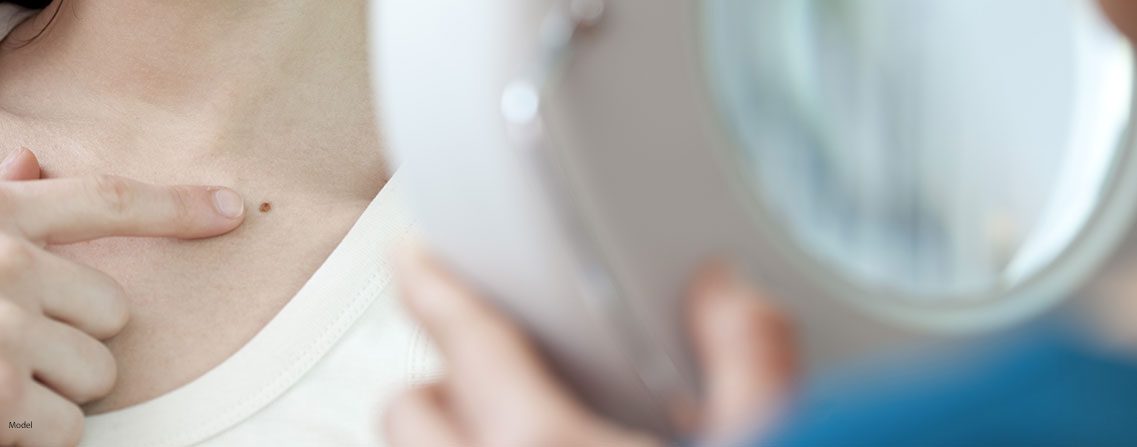
Skin cancer is the most prevalent form of cancer, affecting one in five Americans. More people have been diagnosed with this condition in the last 30 years than all other cancers combined. Increased sun exposure puts men and women at risk of developing skin cancer, with nearly 90 percent of skin cancers such as basal cell carcinoma, squamous cell carcinoma, and melanoma caused by the sun.
While these statistics may be alarming, the good news is that there is a 98 percent survival rate with early detection. Patients should always be on the lookout for possible signs of skin cancer. If you have a mole or other type of skin lesion that you fear may be cancerous, do not wait to have it checked out. Contact your doctor to undergo testing immediately.
There are five simple signs that could indicate skin cancer, commonly referred to as the ABCDEs of skin cancer. Beware of any lesions that exhibit one or more of these symptoms:
Diagnosis is the first step in treating skin cancer. During your appointment, a small portion of the lesion is cut away and sent off to a lab to be biopsied. If the results come back as precancerous or cancerous, the following step will be treatment.
Skin cancer treatment always begins with the removal of the cancerous mass. Smaller lesions are often removed in-office using local anesthesia. Removal techniques can include excision or desiccation. More aggressive forms of skin cancer may require further treatment such as chemotherapy or radiation.

During your consultation, Dr. Hung will evaluate your case, discuss his findings, and recommend the best treatment for your individual needs.
Basal cell carcinoma is the most common form of skin cancer as well as the most common cancer in general.
Squamous cell carcinoma is the second most common form of skin cancer, and the vast majority of cases are related to sun damage accumulated during childhood and into adult life. Most squamous cell carcinomas are slow growing and easily treated. However, they can sometimes be fast growing and extensive, and they may spread or even travel along the nerves. More aggressive cases of squamous cell carcinoma can occur in immunosuppressed patients, such as those who have undergone an organ transplant.
Melanoma is a cancer that affects pigment cells. It generally presents itself as a pigmented (darker-colored) lesion that has recently appeared or presented changes in color, border, and/or size.
Following your skin cancer surgery, you may experience some swelling and bruising, but these should resolve after a few weeks. Do not take any aspirin or nonsteroidal anti-inflammatory medication for at least a few days or until instructed otherwise. Avoid any direct exposure to the sun. You will be asked to refrain from strenuous activity for up to three weeks following your surgery. Be sure to follow up with Dr. Hung for several weeks so he can ensure your wounds are healing properly.
Dr. Hung makes every effort to restore your appearance as naturally as possible. The most important factor is to effectively remove your skin cancer and help you regain a sense of peace and restored self-esteem after your surgery.
Scarring will depend on the amount of surgery needed and the size of the treatment site. However, scars can be covered with makeup and are likely to fade over time.
You may experience some discomfort following your skin cancer surgery. You may take TYLENOL® or receive a prescription of TYLENOL® with codeine from your surgeon to help minimize the pain.
Mohs surgery can be used to treat most cases of basal cell carcinoma and squamous cell carcinoma. It can also be used to treat certain kinds of melanoma or unusual skin cancer conditions.
As with most surgical procedures, there are some risks associated with skin cancer surgery. These can include:
Most skin cancer surgeries can result in some level of scarring, especially if the procedure as performed on the face, hands, or neck. Be sure to speak with Dr. Hung about your reconstructive surgery options.
Before and After Photos - individual results may vary
Some images may be models.
Site Designed & Hosted by Plastic Surgery Studios.
Vincent C. Hung, MD, FACS, INC. Copyright © 2024